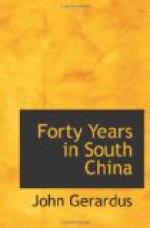“For the present life they can think of no higher happiness than success in acquiring wealth, and the highest happiness after death consists in having sons to supply the wants of their spirits. These are the two objects that engross the highest aspirations of a Chinaman.”
INFANTICIDE
“This will account in part for the barbarous custom of infanticide which prevails to so lamentable an extent among these heathen. Only female infants are destroyed. While the parents are living the son may be of pecuniary advantage to them, and after their death, he can attend to the rites of their souls, and even after his death, through him the parents may have descendants to perform the ancestral rites. A daughter on the contrary, it is supposed, will only prove a burden in a pecuniary point of view, and after she is married she is reckoned to the family of her husband. Her children, also, except her husband otherwise order, are only expected to attend to the spirits of their paternal ancestors.”
“Some have denied the existence of the practice of infanticide among the Chinese, or, they have asserted that if it does exist, the practice of it is very unusual. Every village which we visit in this region gives evidence that such persons are not acquainted with this part of the empire. A few days ago a company of us visited the village of Kokia. It is situated on the northern extremity of Amoy Island, and contains, perhaps, two thousand inhabitants. After walking through the village we sat down for a short time under the shade of a large banyan tree. A large concourse of people soon gathered around us




